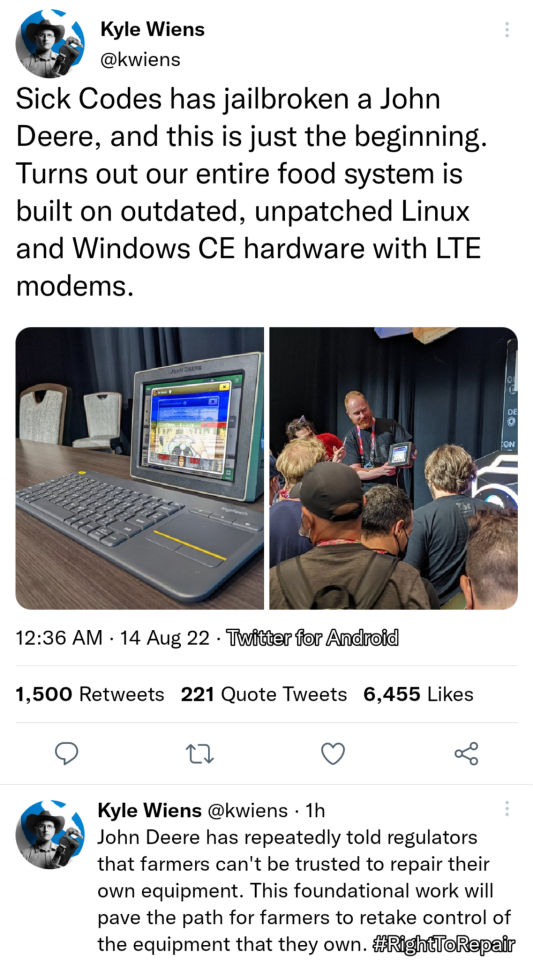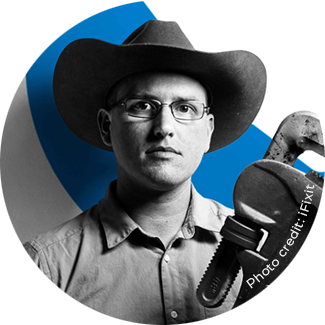#Kyle wiens
Text

2 notes
·
View notes
Text
iFixit and Valve Selling Official Steam Deck Replacement Parts
iFixit and Valve Selling Official Steam Deck Replacement Parts
Valve Steam Deck Photo: Phillip Tracy/Gizmodo
Tea Steam Deck is a sturdy piece of kit, but it’s always nice to have peace of mind that should something stop functioning—be it the screen, joysticks, or buttons—it can be easily replaced. Early adopters of this handheld console now have that reassurance, as iFixit has officially started to sell official replacement parts for Valve’s Linux-based…

View On WordPress
#computing#Deck#DIY culture#gamepad#Gizmodo#handheld game console#iFixit#Kyle Wien#Maintenance#Nintendo Entertainment System#Software#Steam#Steam Deck#Video game consoles
7 notes
·
View notes
Text
"The California state government has passed a landmark law that obligates technology companies to provide parts and manuals for repairing smartphones for seven years after their market release.
Senate Bill 244 passed 65-0 in the Assembly, and 38-0 in the Senate, and made California, the seat of so much of American technological hardware and software, the third state in the union to pass this so-called “right to repair” legislation.
On a more granular level, the bill guarantees consumers’ rights to replacement parts for three years’ time in the case of devices costing between $50 and $99, and seven years in the case of devices costing more than $100, with the bill retroactively affecting devices made and sold in 2021.
Similar laws have been passed in Minnesota and New York, but none with such a long-term period as California.
“Accessible, affordable, widely available repair benefits everyone,” said Kyle Wiens, the CEO of advocacy group iFixit, in a statement. “We’re especially thrilled to see this bill pass in the state where iFixit is headquartered, which also happens to be Big Tech’s backyard. Since Right to Repair can pass here, expect it to be on its way to a backyard near you.” ...
One of the reasons Wiens is cheering this on is because large manufacturers, from John Deere to Apple, have previously lobbied heavily against right-to-repair legislation for two reasons. One, it allows them to corner the repair and maintenance markets, and two, it [allegedly] protects their intellectual property and trade secrets from knock-offs or competition.
However, a byproduct of the difficulty of repairing modern electronics is that most people just throw them away.
...Wien added in the statement that he believes the California bill is a watershed that will cause a landslide of this legislation to come in the near future."
-via Good News Network, October 16, 2023
#united states#us politics#right to repair#planned obsolescence#enshittification#big tech#iphone#sustainability#ewaste#consumer rights#electronics#good news#hope#california#silicon valley
9K notes
·
View notes
Text
This weekend, I watched a hacker jailbreak a John Deere tractor live on stage

Last Saturday, I sat in a crowded ballroom at Caesar’s Forum in Las Vegas and watched Sickcodes jailbreak a John Deere tractor’s control unit live, before an audience of cheering Defcon 30 attendees (and, possibly, a few undercover Deere execs, who often attend Sickcodes’s talks).
The presentation was significant because Deere — along with Apple — are the vanguard of the war on repair, a company that has made wild and outlandish claims about the reason that farmers must pay the company hundreds of dollars every time they fix their own tractors, and then wait for days for an authorized technician to come to their farm and type an unlock code.
Deere’s claims have included the astounding statement that the farmers who spend hundreds of thousands of dollars on tractors don’t actually own those tractors, because the software that animates them is only licensed, not sold:
https://memex.craphound.com/2017/04/22/john-deere-just-told-the-copyright-office-that-only-corporations-can-own-property-humans-can-only-license-it/
They’ve also claimed that locking farmers out of their tractors is for their own good, because otherwise hackers could take over those tractors and endanger the food supply. While it’s true that the John Deere tractor monopoly means that defects in the company’s products could affect farms all around the world, it’s also true that John Deere is very, very bad at information security:
https://pluralistic.net/2021/04/23/reputation-laundry/#deere-john
The company’s insistence that they are guardians of farmers and the agricultural sector is a paper-thin cover for monopolistic practices and rent-seeking. Monopolizing the repair and reconfiguration of Deere products gives the company all kinds of little gifts — for example, they can refuse to fix the tractors of dissatisfied customers unless they agree to gag-orders:
https://pluralistic.net/2022/05/31/dealers-choice/#be-a-shame-if-something-were-to-happen-to-it
And because so few of us understand information security, or monopoly, or agribusiness (let alone all three!) they can spin their dangerous, grossly unfair practices as features, not bugs. Remember when they trumpeted the fact that they’d remotely bricked some Ukrainian Deere products that had been looted by Russian soldiers?
https://doctorow.medium.com/about-those-kill-switched-ukrainian-tractors-bc93f471b9c8
What they didn’t say — and what almost no one pointed out — was that this meant that anyone who could hack John Deere’s system could brick any tractor — including, say, the Russian military’s hacking squads. They also didn’t say that Ukrainian farmers had long chafed under Deere’s corporate control, and had developed illegal third-party tractor firmware that farmers all over the world had covertly installed:
https://www.vice.com/en/article/xykkkd/why-american-farmers-are-hacking-their-tractors-with-ukrainian-firmware
And that means that the Russian looters who supposedly were foiled by Deere’s corporate remote killswitches can re-activate their tractors, by using the Ukrainian software developed in response to the company’s monopolistic practices.
Which brings me back to Sickcodes and his awesome presentation at Defcon 30 this weekend. I watched from the front row, sitting next to the repair champion Kyle Wiens, founder of Ifixit, who turned his notes into an excellent Twitter thread:
https://twitter.com/kwiens/status/1558688970799648769
As Kyle points out, Deere has repeatedly told state and federal lawmakers and regulators that farmers can’t be trusted to repair or modify their own tractors. This is obviously nonsense: indeed, for decades, Deere product development consisted of sending engineers out to document the improvements farmers had made to their tractors so the company could copy them:
https://securityledger.com/2019/03/opinion-my-grandfathers-john-deere-would-support-our-right-to-repair/
Writing for Wired, Lily Hay Newman provides some great technical details on the hack, including how Sickcodes acquired (and accidentally broke!) several 2630 and 4240 touchscreen control units, eventually demounting the main controller and soldering it into a new board that he used to probe the system:
https://www.wired.com/story/john-deere-tractor-jailbreak-defcon-2022/
He discovered that the system was designed to send an extraordinary amount of data to John Deere — his control unit tried to exfiltrate 1.5GB worth of data once he brought it online. He also discovered that as soon as he was able to conjure up a terminal, he had root access to the system.
This was great news for Sickcodes, but it raises serious questions about Deere’s information security practices. As Kyle points out, this entire system ran on deprecated, unpatched, elderly GNU/Linux software and Windows CE, an operating system that was end-of-lifed in 2018, and which was so bad that people forced to use it typically called it “Wince.”
Sickcodes discovered all kinds of security worst-practices in John Deere’s security — even in the parts of its security that were intended to secure the company’s profits from its own customers’ best interests. For example, at one point Sickcodes put the control unit into maintenance mode by repeatedly rebooting it, so that it refused to allow him to do anything until he brought it to a dealer. He discovered that all it took to convince the computer that he was a dealer was to create an empty text file on its hard-drive whose filename was something like “IAmADealer.txt” (I didn’t write down the exact filename, alas, but that’s not far off!).
Another revelation from Sickcodes: the company made extensive use of free/open source software but seems to be gravely out-of-compliance with the license terms (I’m told that organizations that do legal enforcement of free/open licenses are now aware of this).
So to recap: the company says it has to block farmers from having the final say over their own tractors because they could create security risks and also threaten Deere’s copyrights (the company even claims that locking down tractors is necessary to preventing music infringement, as though a farmer would spend $600k on a tractor so they could streamrip Spotify tracks).
But in reality, the company itself is a dumpster-fire of information security worst practices, whose unpatched, badly configured, out-of-date tractors are a bonanza of vulnerabilities and unforced errors. What’s more, the company — which claims to be staunch defenders of copyright — use their copyright locks to hide the fact that they are committing serious breaches of software copyright.
In serious information security circles, it’s widely understood that “there is no security in obscurity” — that is, hiding how a system works doesn’t make it secure. Usually, this is understood to be grounded in the fact that if you hide your work, you might make mistakes that others would spot and point out to you:
https://doctorow.medium.com/como-is-infosec-307f87004563
But there’s another problem with security through obscurity: when you don’t have to show your work to others, you can be sloppy. Whereas, if your work is open to inspection, your own aversion to being seen as slapdash will impose a rigor on your process, which will make the whole thing better:
https://doctorow.medium.com/the-memex-method-238c71f2fb46
With Deere’s security through obscurity, we see both pathologies on display. The company uses its opacity to commit sloppy security bugs, and also to cover up its violations of copyright law — and then, of course, it accuses its critics of being guilty of those two exact sins. Takes one to know one:
https://doctorow.medium.com/takes-one-to-know-one-104d7d749408
Sickcodes closed out by saying that while his hack required a lot of fiddling with the hardware, he was already scheming to build a little tool that could access and jailbreak a tractor without ripping chips off a board or doing a lot of soldering.
And then he played a custom, farm-themed version of Doom on his jailbroken tractor controller.
Image:
Cryteria (modified)
https://commons.wikimedia.org/wiki/File:HAL9000.svg
CC BY 3.0:
https://creativecommons.org/licenses/by/3.0/deed.en
[Image ID: A vintage John Deere tractor whose wheel hubs have been replaced with HAL 9000 eyes, matted over a background of the cyber-waterfall image from The Matrix.]
2K notes
·
View notes
Photo

A goddamned tractor? Yeah, it runs Doom.
Directly quoting iFixit CEO Kyle Wiens on Twitter, reporting live from DefCon 2022 in Las Vegas:
Sick Codes has jailbroken a John Deere, and this is just the beginning. Turns out our entire food system is built on outdated, unpatched Linux and Windows CE hardware with LTE modems.
John Deere has repeatedly told regulators that farmers can't be trusted to repair their own equipment. This foundational work will pave the path for farmers to retake control of the equipment that they own.
And yes, that is corn-themed Doom running on a John Deere touchscreen. sickcodes really went all out for this. You can harvest corn to raise your health or go hunt down the piggies!
Putting together a themed mod for your security-exploit demonstration is a whole new level from what we usually see. Kudos!
Thanks to Linguica for bringing this to my attention!
957 notes
·
View notes
Text

LEKTION 250🙏🏻
Ein Kurs in Wundern
Greuthof Verlag
Ich will mich nicht als begrenzt sehen.
Lass mich heute GOTTES SOHN erblicken und seine Herrlichkeit bezeugen. Lass mich nicht versuchen, das heilige Licht in ihm zu verschleiern und seine Stärke gemindert und zu Gebrechlichkeit reduziert zu sehen noch die Mängel in ihm wahrzunehmen, mit denen ich seine Souveränität angreifen möchte.
Er ist DEIN SOHN, mein VATER. Und heute möchte ich seine Sanftheit sehen anstelle meiner Illusionen. Er ist, was ich bin, und so wie ich ihn sehe, sehe ich mich selbst. Heute möchte ich wahrheitsgemäß sehen, damit ich mich an diesem Tag endlich mit ihm identifizieren möge.
🙏🏻
Erwache:
https://youtube.com/shorts/hoTxBhN9N7s?si=3CXPzl1x7JsoSSBQ
👻 Simone Fugger
www.kursvergebung.com
Auf Tour mit EKiW🚗:
Jetzt dieses WE Sa./So. 9.-10.9. Wien Workshop Antlitz CHRISTI mit Peter Steinhagen*
30.9.-1.10. Berlin Workshop das Herzstück HFL mit Constantin Cranz*
7.-8.10. Hamburg Workshop Inneres Kind mit Andreas Scholz*
4.-5.11. Berlin Workshop mit Agnes Ugowski*
9.-10.12. Berlin Workshop mit Maika & Torsten*
Anmeldung & Flyer: www.kursvergebung.com oder 01577 5197 123 [email protected]
Diese Info gerne weitergeben. Dankeschön! Danke GOTT! Lichtgruß aus München Simone💞🙏🏻
Unterstützerkonto:
paypal.me/simonefugger oder HHer Sparkasse IBAN DE81 2005 0550 1219 4002 21
#transformation#einkursinwundern#nondualität#simonefugger#gottesliebe#vergebung#ekiw#freude#gottesfrieden#geistesschulung#erlösung#Spotify
0 notes
Text
Apple backs Right to Repair bill in California
Apple officially endorsed Senator Susan Talamantes Eggman’s Right to Repair Bill in California, according to iFixit. Reuters says the tech giant even sent legislators in the state a letter, urging them to pass Senate Bill 244, which requires companies to provide consumers and third-party providers the repair diagnostics and parts needed to be able to repair their products. iFixit’s CEO Kyle Wiens…

View On WordPress
0 notes
Text
EFF Award Winner: Kyle Wiens
EFF Award Winner: Kyle Wiens
For over thirty years, the Electronic Frontier Foundation (EFF) has awarded those paving the way for freedom and innovation in the digital world. Countless luminaries working in digital privacy and free speech gathered for this Pioneer Award Ceremony in San Francisco over the decades. This year, we are excited to relaunch that annual celebration as the first-ever EFF Awards!
The EFF Awards is a…

View On WordPress
0 notes
Text
Smartphones Are Like Cars. So Why Don’t We Maintain Them?
Smartphones Are Like Cars. So Why Don’t We Maintain Them?
Regularly replacing our phones takes a toll on our wallets and the environment. We should instead take care of them as we do our cars.
“Everyone knows the tires on your car wear out and you need to replace them,” said Kyle Wiens, the chief executive of iFixit, a site that publishes instructions for repairing electronics. “There’s a psychological delusion around not having to do maintenance on…

View On WordPress
0 notes
Text
Defcon steam

DEFCON STEAM DRIVERS
DEFCON STEAM SOFTWARE
DEFCON STEAM CODE
As documented by Vice, owners of John Deere tractors increasingly turn to forums, pirated maintenance software, and hacked firmware releases to keep their machinery running.įarmers are now combatants in the right-to-repair market, rubbing shoulders with figures most commonly associated with the consumer tech industry. Owners are limited when performing basic repairs and upgrades. Instead, they must rely on a certified (and expensive) engineer. Like a smartphone or a Tesla, they’re locked down. Computers sit at the heart of their tractors. John Deere is known for its vociferous opposition to the right-to-repair movement. The idea that a threat actor could remotely disable or damage agricultural equipment is, frankly, terrifying. Its tractors play an essential role in the global food chain. It holds (roughly) one-third of the market. We note that John Deere is the leading tractor manufacturer. If, as iFixit founder Kyle Wiens pointed out, “outdated and unpatched Linux and Windows” is the gasoline, unfettered root access is the match.
DEFCON STEAM SOFTWARE
This issue is especially bad considering John Deere 4240’s underlying software is fundamentally insecure.
DEFCON STEAM DRIVERS
Modern processors restrict the access of user-facing applications to parts of the computer’s memory, IO, and CPU instructions, while giving drivers and the underlying operating system kernel unfettered access. It’s a fundamental precept of modern operating system and hardware design.Ĭhipmakers, for example, implement this with the protection ring model. This rule is called the Principle of Least Privilege, or PoLP. Why? Because if an application runs with root privileges by default, it can do any number of harmful things to the underlying system.īy limiting what an application can do, you limit the potential damage caused by a malicious application. – Everything runs as root- Sick.Codes August 14, 2022Ī cardinal security rule is that applications should have the least amount of permissions needed to do their jobs. – John Deere’s X window display server is g6wm – The weird graphical artifacts are just Yocto/QT quirks n 3D transparency stuff There’s a reason Windows asks for your consent when installing an application, or when a program seeks higher levels of access.
DEFCON STEAM CODE
The keys to the kingdomĪdditionally, the code runs as root - or, put plainly, with administrative privileges. The tractor’s computer does not check whether an application is signed with a John Deere-exclusive cryptographic certificate, or against a pre-defined list of checksums. SickCodes had to physically disassemble the machine, according to The Register, and modify its internals.įortunately, once the code was physically on the machine, he faced no further challenges. Porting Doom to the tractor was not an easy task. Similarly, the DoomGuy’s arsenal of high-power firearms and directed energy weapons became a tractor wheel. Skelegant replaced Doom’s Martian hellscape with (what else) a field of wheat. Naturally, this, too, was heavily modded. SickCodes partnered with New Zealand hacker Skelegant to create a build of the game specifically for the hardware. Playing Doom on a John Deere tractor display (jailbroken/rooted) at /ih0QUTGNuS- Sick.Codes August 14, 2022

0 notes
Text

Kyle Wiens fights for the right to repair cars (Episode 157) - Automotive News http://dlvr.it/SV2DWc
0 notes
Text
Harley-Davidson fined for violating consumer repair choices law - Milwaukee Journal Sentinel
Harley-Davidson fined for violating consumer repair choices law – Milwaukee Journal Sentinel
Consumers now have more choices when it comes to repairing everything from their cellphones to farming equipment.Recently passed “right to repair” legislation gives people freedom to use independent repair shops or their own knowledge to fix items without invalidating the manufacturer’s warranty. Kyle Wiens, CEO of the San Luis Obispo, California, online repair community iFixit, said people have…
View On WordPress
0 notes
Photo

iFixit CEO names and shames tech giants for right to repair obstruction - iFixit chief Kyle Wiens claims Apple, Samsung, and Microsoft are monopolising the supply chain and designing products to prevent users from being able to easily repair them. https://ift.tt/3wOKoCW
13 notes
·
View notes
Link
A lot of races in the 2020 election were close, but one important one wasn't: Question 1 in Massachusetts, which "allows car owners to access and share data generated by the operation of the vehicle with independent repair shops." It's basically right-to-repair legislation and it passed with just shy of 75% of the vote.
Kyle Wiens, the CEO of iFixit, has been at the front of the right-to-repair fight for years, working across industries to make it easier for people to fix their own stuff, for mechanics and repair professionals to keep working. He was thrilled to see Question 1 pass by such a wide margin and is hopeful that it's a sign of things to come.
Wiens came on this week's Source Code Podcast to talk about the history of the right-to-repair fight, why more progress has been made with the automotive industry than anywhere else, and why he's hopeful to see broader, electronics-focused bills pass next year.
Below are excerpts from our interview, edited and condensed for length and clarity.
Tell me a little about the history of right-to-repair legislation.
Really it goes back the '90s, when electronics started moving into all of the products that we have. And as a result the assumption that we've been able to repair everything has been diminished. So in reaction to this Massachusetts passed a ballot initiative in 2012 for cars that said: If you want to be able to fix your own car, you want to be able to take it to a local mechanic, the manufacturers cannot stop you. They have to provide the information, parts and tools that you need.
That kicked off a wave of broader electronics right-to-repair legislation, where repair.org, iFixit and others have been trying to get that passed ever since. And we've gotten very close, but it hasn't passed yet.
There are two competing things going on here, right? On the one hand, you have this fight to make things more repairable, in cars but across the electronics industry. And then on the other side, you have the electronics industry, which seems to resolutely make things less repairable over time. That is the clear trend that this whole industry is on. Is that fair?
I think there are signs that maybe that is starting to reverse, but certainly there has been a trend toward making things thinner, gluing batteries and stopping making service manuals available. The default used to be: Of course you could fix everything! The Apple II came with the board schematic for the computer, so Apple has done this [in the past].
On the other hand, the automotive world really hasn't changed that much. Cars are still fixable, independent mechanics continue to thrive. And so that really shows the difference between a regulated environment that has rules in place to protect your repair rights and the unregulated environment that we have in the electronics world.
Before we get into the legislation, make the case against yourself. What is the case that the electronics industry makes for making things hard to repair?
I mean, one argument is that in order to accomplish the very thin form factors that we have, you have to make things very thin, [and] it's not possible to make a phone as durable and thin as consumers demand and maintain upgradability and repairability. And so I have been accused of standing in the way of progress. Of course, this is just inevitable technical progress! The headphone jack is an element of the past! We don't need to drag the past into the future, let's invent our new wireless future!
So that that is one argument. Another argument that Apple has made is that if you allow independents to repair things, it will introduce security vulnerabilities. They famously told a legislator in Nebraska that if Nebraska passed right-to-repair it would turn the state into a mecca for hackers. And that was the argument that was used in Massachusetts ... it was all about security of automobiles.
I'll just lay my own cards on the table: the security argument of that makes absolutely no sense to me. But there is something to the first part of that, that there are like design trade-offs that these companies would have to make in order to make things more repairable, that go against what consumers say they want. Is there any merit to that argument that you see?
So there is a sliver of merit to it. Of course there are design trade-offs, right? Designing a modern electronic gizmo is hard. You have to deal with thermal factors, you have battery life to worry about, you have what we call torsional rigidity, which is how stiff the frame feels, you have drop testing, you have waterproofing, you have all these objectives that you're trying to meet. And so you have to decide if you also want to push the designers to achieve repairability.
Anytime you glue something together, it's easier to accomplish a lot of things. We took the Apple Watch to a master watchmaker, and we showed him the Apple Watch design. And he laughed at it. He said, "This is so amateur." He was just shocked that they that they glued the the screen onto the thing. And he's like, "Rolex would never ever do that." They're going to accomplish the same thin form factor, they're going to accomplish the same level of waterproofing, the same everything else, but they're going to do it in what is a more difficult manufacturing process.
I like to think of glue as the lazy approach. It is absolutely possible to accomplish an upgradeable, repairable product in the same form factor. You don't have to sacrifice thinness for serviceability. The perfect proof to this point is Microsoft's latest redesign of the Surface Laptop. The Surface Laptop was the worst-scoring laptop that we had ever scored on our repairability score, which goes from one to 10. One is almost impossible to fix, 10 is very easy to fix. The Surface Laptop got a zero.
So Microsoft, from the Surface Laptop 2 to the 3, they redesigned the internals of the product and they made it repairable. We rated the latest Surface Laptop a five out of 10 on repairability, which is the biggest single point jump that we have seen in any product generation. But the key is the external form factor of the product is completely unchanged. It's the same weight, it's the same thickness, it's the same aesthetics, they didn't change anything on the outside; they had to re-architect the inside to accomplish it. This proves the point that you can have forward progress, you can have these cutting-edge form factors, and have a serviceable product.
So let's talk about Massachusetts. I actually don't know any of the history of the legislation that came up this year. Where did this come from?
Automotive right-to-repair legislation in the United States goes back to the 1970s. The Clean Air Act actually required the automakers make information around the emission system available to independents, so that they could keep the emission systems operating. But as computers made it [into] the cars and things got more sophisticated, the car manufacturers started locking mechanics out. So in 2012, Massachusetts passed a ballot initiative, which was Question 1 back then, that said, "Hey, automakers, you have to use standardized diagnostic interfaces on these cars and make that available to independents and consumers." After that, the car manufacturers agreed to apply the Massachusetts law nationwide. Every carmaker except Tesla agreed to apply the Massachusetts law nationwide.
So now, fast forward to 2020. What is starting to happen is 90% of 2020 model year cars come with a cellular modem in the car, and they are sending diagnostic information — maybe information on whether your oil needs to be changed, if there's an error code — they're sending that directly to the manufacturer, the manufacturer tells your local dealer and then your dealer calls you up and says, "Hey, you want to come in for an oil change? We've got a slot tomorrow at 11." Well, that's great service. But what that does is that cuts out competition from your local repair shops. And so that's what the Massachusetts 2020 ballot initiative was about. This is Question 1, and it said, "Do you want to make sure that the wireless repair information that's being sent from your car is available to independents as well as the manufacturer?"
Why did the old rule not apply anymore?
Because the old rule was a wired diagnostic interface. So if you plug into the car, you still have access to that information. But the manufacturers, everything they're doing going forward is all going to be wireless. And that's how Teslas work. Tesla is constantly sending updates to your car.
8 notes
·
View notes
Video
You're welcome Dan 😅😍
#bastille#bastille tour#bastille live#bastille wild world#bastille vienna#vienna#wien#dan smith#kyle simmons#Woody Wood#will farquarson#charlie barnes#gasometer#bastille concert
2 notes
·
View notes
Text
I was tagged by @littlereyofsunlight
Dogs or cats? cats 1000% I got bit by a random dog again a couple of weeks ago. wtf
YouTube celebrities or normal celebrities? Eh, both? neither? how about tumblr mutuals. that would be my favorite
If you could choose to live anywhere, where would it be? somewhere near the mountains and water
Disney or Dreamworks? Disney
Favourite childhood TV show? I had no idea what it was called, but they would do adaptations of Grimm’s fairy tales.
The movie you’re looking forward to in 2020? Mulan
Favourite book you read in 2019? Becoming Nobody by Ram Dass
Marvel or DC? Marvel, but also Batman.
If you chose Marvel, favourite member of the X-Men? Wolverine
Night or day? Day.
Favorite Pokémon? I know nothing about pokemon
Top 5 bands/artists? Adele, Prince, Jason Isbel, Otis Redding, The Weeknd
Top 10 books?
Dracula
Good Omens
Hitchiker’s Guide to the Galaxy
My Dark Places, James Ellroy
Children of Time, Adrian Tchaikovsky
Bone Season, Samantha Shannon
The Giant’s House, Elizabeth McCracken
Beauty, Robin McKinley
The Lion, the Witch, and the Wardrobe
Perdido Street Station, China Mieville
Top 4 movies? (I may have cheated)
Terminator
Ghostbusters
Eastern Promises
Bladerunner 2049
No Country for Old Men
Sicario
The Lost Boys
The Witches of Eastwick
The Godfather
I, Tonya
Hellboy
Logan
Moana
Flash Gordon
US or Europe? uh ... yes?
Tumblr or Twitter? Tumblr
Favourite vacation destination? NYC
Favourite YouTuber? I have soooooo many, so I’m going to list some channels. Bon Appetite, Adam Savage’s Tested, SciShow, Pick Up Limes, Evelyn from the Internets, Hallease, Mark Wiens, The Detail Geek, PBS Spacetime, Baumgartner Restoration, Thomas Johnson furniture restoration, Lisa Eldridge, Frank Howarth, Claire Marshall, Simone Giertz, Ariel Waldman, MoKnowsHair, Journey to the Microcosmos
Favourite author? Lisa Kleypas, Pema Chodron
Tea or coffee? Yes. Both. Always.
OTP? sooooo many. I’ll go with Sarah Connor/Kyle Reese, but there are many others.
Do you play an instrument or sing? In theory I can play the piano but I really wouldn’t put that one to the test.
tagging @luthienebonyx, @dresupi, @tangofic, @katherinecooke, @dorrinverrakai1
8 notes
·
View notes